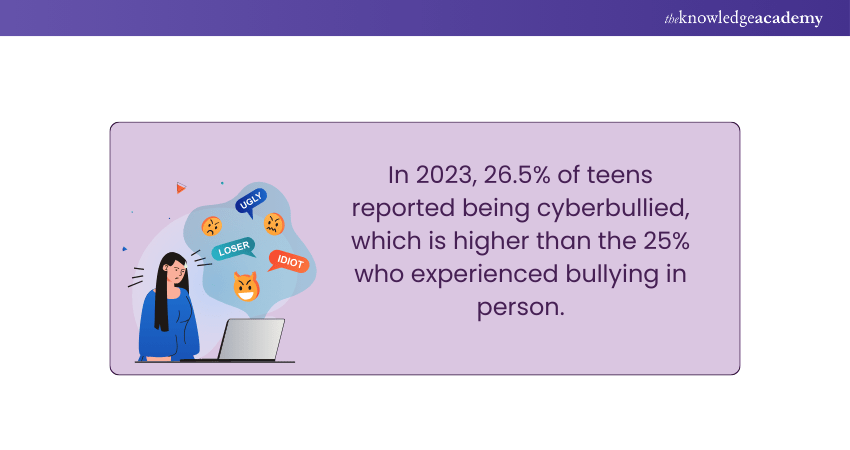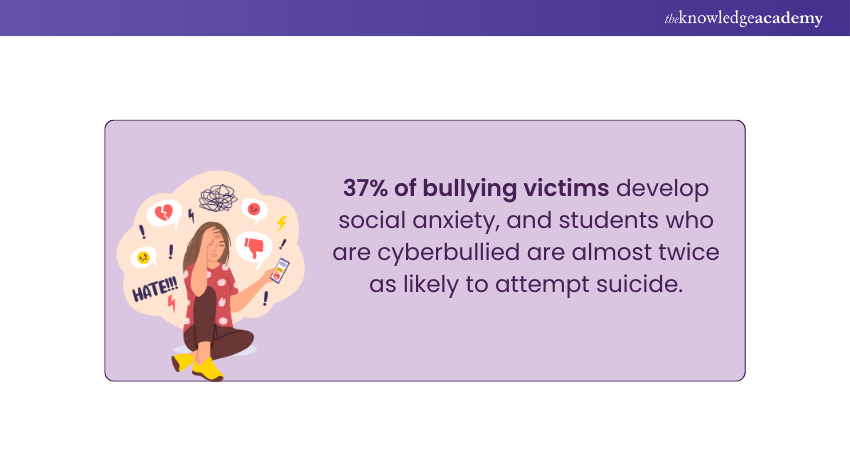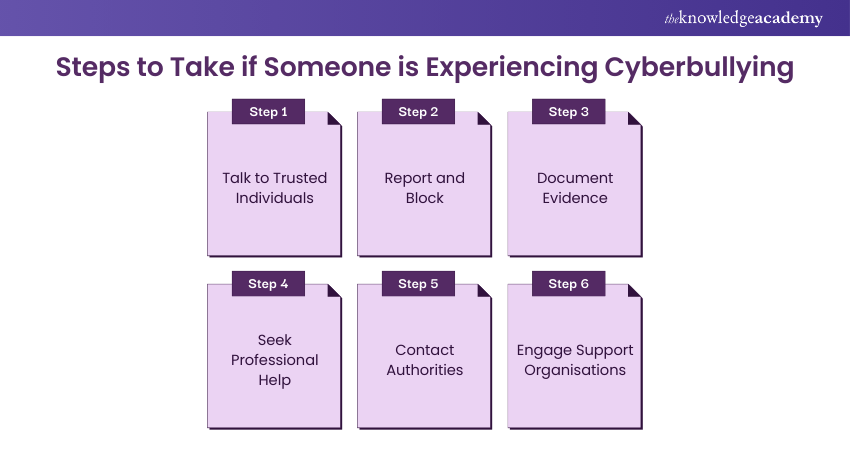We may not have the course you’re looking for. If you enquire or give us a call on 01344203999 and speak to our training experts, we may still be able to help with your training requirements.
We ensure quality, budget-alignment, and timely delivery by our expert instructors.

We have to ask: Are our online places safe in today's digital world? Although the internet has altered our means of connection and communication, it has also resulted in Cyberbullying. However, what is Cyberbullying, and why is it such a serious risk? Can something meant to bring us together be used to cause harm?
In this blog, we'll explore What is Cyberbullying. We'll look at its different forms, how cyberbullies operate, and how it affects people. Together, let's learn how to spot this problem, fight against it, and make our online spaces safer and kinder.
Table of Contents
1) What is Cyberbullying?
2) Common Tactics and Threats of Cyberbullies
3) What are the Impacts of Cyberbullying?
4) Why are Adults with Learning Disabilities More Vulnerable?
5) If Someone is Bullying Me Online, Who Should I Talk To?
6) Conclusion
What is Cyberbullying?
Through digital channels including social media together with email and text messaging and online forums people carry out Cyberbullying activities to harm others. The traditional space boundaries of bullying are non-existent for Cyberbullying which threatens victims continuously through broad-based accessibility at any place and hour.
Key Characteristics of Cyberbullying Include:
a) Pervasiveness: The internet is accessible around the clock, allowing bullying to persist even in private spaces.
b) Anonymity: Many bullies hide behind fake profiles, emboldened by the lack of accountability.
c) Virality: Harmful messages or images can be widely shared, amplifying the damage.
Common Tactics and Threats of Cyberbullies
Cyberbullies employ a variety of tactics to target their victims, each with its unique consequences. The most common tactics include:
a) Harassment: Persistent sending of offensive or threatening messages to intimidate the sufferer.
b) Denigration: Spreading fake, derogatory, or malicious information to damage the sufferrer’s reputation.
c) Impersonation: Posing as the victim online to cause embarrassment or harm their relationships.
d) Outing and Trickery: Coercing individuals to share non-public information or secrets and then exposing them publicly.
e) Exclusion: Deliberate isolation of someone from online groups or communities.
f) Doxxing: Sharing personal or sensitive information, such as addresses or phone numbers, without consent.

What are the Impacts of Cyberbullying?
Cyberbullying affects victims in profound ways, impacting their emotional, physical, and Mental Health .
Mental Effects
Cyberbullying may result in:
a) Depression and Anxiety: The constant nature of Cyberbullying destroys a victim’s sense of safety and self-worth. Over time, this relentless harassment can accumulate into chronic stress that morphs into depression and crippling Anxiety.
b) Severe Effects: If the exposure to harassment is repeated, there can be a severe toll which might exceed that of Post-Traumatic Stress Disorder (PTSD). The emotional scars can remain long after the bullying has stopped.
c) Sleep Disruptions: The anxiety and terror from Cyberbullying can frequently lead to disturbances in sleep cycles. Victims may struggle with insomnia or face recurring nightmares, further eroding their mental well-being and ability to recover.

Emotional Effects
Emotionally, victims may experience:
a) Shame and Humiliation: Public exposure to private matters often leads to feelings of humiliation and a loss of dignity.
b) Isolation: Many victims withdraw from social interactions, fearing judgment or further attacks.
c) Anger and Resentment: The inability to defend themselves or stop the bullying may lead to frustration and rage.
Physical Effects
The emotional and mental strain often takes a physical toll, resulting in:
a) Headaches and Digestive Issues: Stress often causes anxiety headaches and interferes with digestion.
b) Chronic Fatigue: Constant emotional distress can channel energy levels down, due to constant tiredness.
c) Suppression of Immune System: Chronic stress can also reduce the immune response, making individuals more susceptible to diseases.
Learn Malware Analysis techniques to detect, prevent, and respond to cyber threats effectively by registering in Malware Analysis Training now!
Why are Adults with Learning Disabilities More Vulnerable?
Cyberbullying is more likely to affect certain populations, such as adults with learning difficulties. This increased vulnerability is caused by multiple factors:
Limited Digital Literacy
Difficulty navigating online safety measures makes them easy targets for cyberbullies.
Social Stigma
Deep-rooted societal biases and discrimination against people with disabilities frequently find their way into online abuse.
Reliance on Digital Communication
Online platforms are a lifeline to maintain social connections for many adults with learning disabilities, but Social Media can also expose them to increased risks of harm. The Social Media and Mental Health effects are particularly concerning in this case, as the lack of real-world interactions and potential for online harassment can harm their mental well-being.
If Someone is Bullying Me Online, Who Should I Talk To?
It is essential that you take immediate action if you or someone you know is being harassed online. The following are some easy steps to take:

1) Talk to Trusted Individuals
a) Confide in someone you trust (family member, friend, teacher).
b) Sharing your experience helps relieve emotional stress and may lead to potential solutions.
2) Report and Block
a) Use the platform's reporting tools to flag abusive content and block the bully.
b) Most online platforms offer mechanisms to address harassment.
3) Document Evidence
a) Take screenshots or save messages to create a record.
b) This evidence may be vital if the situation escalates.
4) Seek Professional Help
a) Consult a mental health professional if the bullying affects your emotional or psychological well-being.
b) Therapists and counsellors can provide coping strategies to navigate the distress.
5) Contact Authorities
a) For serious cases, especially involving threats or illegal activities, report the incident to law enforcement.
b) Cyberbullying may be a punishable offence in many areas.
6) Engage Support Organisations
a) Seek help from organisations that specialise in supporting Cyberbullying victims.
b) These groups provide resources, guidance, and advocacy to help reclaim your digital space.
Learn how to identify, prevent, and respond to cyber threats effectively by registering in Cyber Security Awareness Course today!
Conclusion
Understanding What is Cyberbullying gives us the foundation to deal effectively with its dangerous consequences. Once we identify its patterns and results, we can introduce specific actions to fight its spread and build protective virtual spaces for all users. Together we should create an online culture built on kindness and respect.
Enhance your Cyber Security skills and protect your data from evolving digital threats – sign up for Cyber Security Training now!
Frequently Asked Questions
What is the Definition of Cyber Abuse?

Cyber abuse refers to using digital platforms to harass, intimidate, or harm someone emotionally, mentally, or socially. It includes activities like online threats, shaming, stalking, and the unauthorised sharing of personal information.
How Does Cyberbullying Start?

Cyberbullying often starts with disagreements, jealousy, or power imbalances. It may begin as hurtful comments, spreading false rumours, or excluding someone online, escalating as bullies exploit the anonymity and reach of digital platforms to amplify harm.
What are the Other Resources and Offers Provided by The Knowledge Academy?

The Knowledge Academy takes global learning to new heights, offering over 3,000 online courses across 490+ locations in 190+ countries. This expansive reach ensures accessibility and convenience for learners worldwide.
Alongside our diverse Online Course Catalogue, encompassing 19 major categories, we go the extra mile by providing a plethora of free educational Online Resources like News updates, Blogs, videos, webinars, and interview questions. Tailoring learning experiences further, professionals can maximise value with customisable Course Bundles of TKA.
What is The Knowledge Pass, and How Does it Work?

The Knowledge Academy’s Knowledge Pass, a prepaid voucher, adds another layer of flexibility, allowing course bookings over a 12-month period. Join us on a journey where education knows no bounds.
What are the Related Courses and Blogs Provided by The Knowledge Academy?

The Knowledge Academy offers various Cyber Security Training, including Cyber Security Awareness, Cyber Security Risk Management and Social Engineering Training. These courses cater to different skill levels, providing comprehensive insights into Threat Intelligence.
Our IT Security & Data Protection Blogs cover a range of topics related to Cyber Security, offering valuable resources, best practices, and industry insights. Whether you are a beginner or looking to advance your Data Protection skills, The Knowledge Academy's diverse courses and informative blogs have got you covered
Upcoming IT Security & Data Protection Resources Batches & Dates
Date
 Cyber Security Awareness
Cyber Security Awareness
Fri 9th May 2025
Fri 8th Aug 2025
Fri 5th Dec 2025






 Top Rated Course
Top Rated Course



 If you wish to make any changes to your course, please
If you wish to make any changes to your course, please


